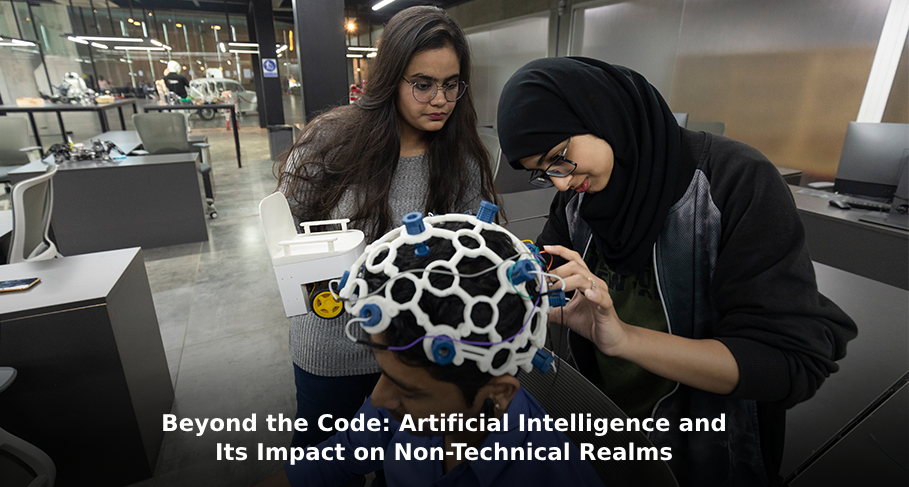Education today results from rigorous exposure to live insights across the World, which is inevitably fuelled by technology and Artificial Intelligence. Transcending geographical barriers, while technology connects us to every corner of the world, AI enables this virtual world. The Oxford Learner’s Dictionary defines Artificial Intelligence as the “study and development of computer systems that can copy intelligent human behavior”. While much has been spoken about in the 20th century, AI has set the stage to dominate the 21st century in unimaginable ways.
While AI’s impact on technical realms is undeniable, its influence has mainly expanded into non-technical domains. From fields like Business, Healthcare, Marketing, Finance, and Manufacturing to Design and Legal avenues, AI has redefined how processes are executed in these areas. This directly impacts the kind of skill training and teaching required for students aspiring to work in these fields. This can happen only by actively incorporating Artificial Intelligence in the realm of graduate education.
This blog will explore the use of AI in non-technical fields, particularly Law, Design, Finance, and Marketing. While doing so, the article will highlight the significance of exposure to AI in higher education today. It is well understood that AI has taken over the world, proposing new resolutions to older problems. However, like any other technological advancement, AI presents challenges, which this article will explore.
AI in Legal Studies
AI is a boon for the legal industry. AI in law firms can improve efficiency by providing cost-saving benefits and automating routine tasks. Regarding Legal research, AI has changed the game for the better. From analyzing information on jurisdictions to the latest amendments in laws to scanning data on a case-to-case basis, AI tools have fastened the process for Legal practitioners.
The use of automation tools replicates loads of paperwork. Automation software helps organize and store loads of critical data in legal firms. The biggest benefit of using Artificial Intelligence in the Legal Realm is that it saves time and fastens legal processes.
A good example of AI application in the Indian legal framework is the Supreme Court of India’s use of SUVAS (Supreme Court Vidhik Anuvaad Software). This innovative system facilitates the translation of legal documents between English and vernacular languages, contributing significantly to the legal domain.
AI in Marketing
In marketing, AI enhances the impact of marketing strategies by providing a better understanding of target audiences, automating marketing functions, generating reports, and offering futuristic insights. Specifically, in digital marketing, it aids in improving algorithms for A/B Testing, facilitating more curated segmentation, and nurturing leads on a personalized level.
Additionally, AI tools assist marketers in content generation, enabling them to plan meticulous content strategies aligned with the brand’s business goals. With accurate personalization, precise data analysis, and natural language processing through bots, businesses can strategize for optimal growth, potentially leading to a game-changing impact.
AI in Finance
Artificial Intelligence is utilized better in finance to understand the financial market and its diverse customer base. In finance, transparency and security are significant concerns. AI is employed to detect fraudulent transactions and prevent cyberattacks through round-the-clock monitoring. Like the legal sector, finance also involves substantial documentation and operational expenses. Artificial Intelligence is used to process vast amounts of data and extract insights that can enhance investments, loan processing, and personal finance services.
AI in Design
When we talk about replicating human intelligence in design, it’s all about increasing the pace of the design process. With the integration of AI, designers can now produce projects more efficiently and cost-effectively. Notably, the design prototyping phase sees a significant speed; simple sketches can be refined through cutting-edge AI tools, resulting in prototypes that perfectly align with company goals. Moreover, AI enables the creation of multiple versions of graphics, a strategy effectively utilized by companies like Netflix. Overall, AI in design fosters variety and innovation, enhancing the creative landscape without compromising quality or efficiency.
Challenges with Artificial Intelligence
Artificial Intelligence has numerous benefits for businesses, yet it’s crucial to understand that it replicates human intelligence and has its flaws. Ethical considerations are paramount when integrating AI into the legal framework, particularly concerning privacy and the exposure of critical information. Lawyers must exercise caution regarding the data entrusted to artificial intelligence systems.
Similarly, concerns regarding data privacy extend to marketing, emphasizing the importance of AI tools operating within the bounds of privacy policies and regulations. Furthermore, marketers require adequate training in utilizing AI tools effectively. There is a significant concern regarding AI’s potential to create biased models in finance. This arises from its dependency on historical data, which may contain inherent biases, potentially replicating them as it processes information. AI-powered designs often overlook human-centred design principles, leading to unintended responses from features such as voice recognition and motion sensors. Designers bear the responsibility of addressing these issues to improve their designs further.
Importance of the Study of AI in Non-Technical Field
We have indeed arrived at a place where education is dynamic and ever-evolving, far away from the barriers of the traditional ecosystem, and it needs to be powered by AI.
A well-planned curriculum and pedagogy structure form the foundation. Introducing Artificial Intelligence as a core subject in non-technical areas of study is pivotal. At Woxsen University, students in non-technical fields are exposed to courses like Heidegger to AI, Artificial Intelligence in Business, Data Ethics and AI/SEC, Design Analysis and Algorithm, Cognitive Intelligence, Introduction to Machine Learning, Neural Networks and Deep Learning, AI in Retail and FMCG, and more.

The university’s AI and Robotics Lab is open to students across departments and equipped with cutting-edge infrastructure to conduct various experiments. The lab houses GPUs from NVIDIA, iMacs, and 3-D printers, which support students in design prototyping, field-specific research, creating intelligent decision-making machines, and bringing intricate concepts to reality.
Woxsen University’s applied learning philosophy ensures that students receive firsthand exposure to fundamental concepts of Artificial Intelligence. Additionally, industry leaders from various corporations serve as faculty members, sharing invaluable insights into the field.
Integrating Artificial Intelligence into non-technical fields such as Law, Marketing, Finance, and Design has redefined traditional practices, enhancing efficiency and driving innovation. Despite its numerous benefits, adopting AI involves ethical considerations and challenges that must be addressed diligently.
However, with the right approach and training, AI can effectively empower students and professionals to navigate and leverage its capabilities. By incorporating AI into education, institutions like Woxsen University are preparing the next generation to thrive, stay ahead of the curve, and train the students with capabilities that enable them to be torch-bearers of futuristic AI-induced technology in all fields. Students are equipped to embrace the opportunities and tackle the challenges presented by AI, shaping a future where technology enhances human endeavours.


